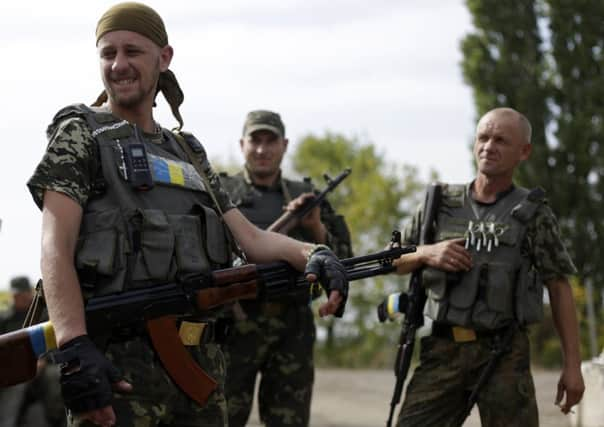European Union impose fresh sanctions on Russia


Launched in conjunction with similar US sanctions, Europe’s new measures came into force yesterday and further turned the screw on the Russian economy by targeting its banking sector along with defence and energy firms, by making it harder for them to tap into international capital markets.
They will also block Russian access to certain western technology, and add to the blacklist of people subject to travel restrictions.
Advertisement
Hide AdAdvertisement
Hide AdThe imposition of the sanctions came despite the shaky truce between the Ukrainian army and Russian-backed forces that brought an end to fighting in eastern Ukraine continuing to hold.
The EU said the measures might be lifted if the ceasefire remains in place. But this apparent concession failed to placate the Kremlin, which took an immediate swipe at the sanctions.
President Vladimir Putin said they were aimed at “disrupting the peace process” in eastern Ukraine.
Sergei Lavrov, the Russian foreign minister, also attacked the measures.
He said: “We believe that adopting such decisions at the very moment when the peace process in Ukraine is gaining strength – we are hoping – this means choosing a path towards undermining the peace process.
“We will react in a calm and adequate manner, first and foremost proceeding from the need to protect our interests.”
Sergei Naryshkin, speaker of the Russian parliament, claimed the US sanctions “were disconnected from reality”, adding that if there was no Ukraine crisis, the West would just find another excuse to impose sanctions.
Although some in central and eastern Europe may question the capacity of sanctions to influence Mr Putin and the Kremlin, Ukraine has welcomed them as an indication of Europe’s apparent commitment to the country’s cause.
Advertisement
Hide AdAdvertisement
Hide Ad“Despite EU countries having their own internal problems, the European countries have demonstrated that Ukraine is now their top priority,” Petro Poroshenko, Ukraine’s president, told an international conference in Kiev yesterday.
“I feel a member of the European family; a full member of the EU family.”
Referring to the apparently ever-closer relationship between Ukraine and the EU that the war has propagated, and saying “Ukrainians had died for European values”, Mr Poroshenko said it would now be “impolite” for the EU not to grant the former Soviet republic a “membership perspective”.
Ukrainian membership of the EU is not on any agenda, and would also meet with furious opposition from the Kremlin, but in a clear symbolic act of friendship, the European and Ukrainian parliaments will hold a joint ratification process on Tuesday of an association agreement signed by Kiev and Brussels.
The decision by Ukraine’s former president Viktor Yanukovych to walk away from a trade pact with the EU last November proved to be the spark that ignited the Ukraine crisis. Following civil unrest and the formation of a new government, Kiev signed the agreement, but the document, which brings Ukraine closer to the European fold, still remains the target of Russian vitriol.
In a move indicative of the deeply troubled relations between Ukraine and Russia, Moscow announced that it would impose tariffs on Ukrainian imports if Kiev went ahead with ratifying the agreement.
Despite Russia’s involvement in the war in eastern Ukraine, the country remains a big market for Ukraine, so any Russian measures could inflict a painful blow on the already fragile Ukrainian economy.